Life Extension Magazine®
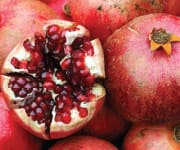
Despite billions of dollars spent every year on cholesterol-lowering statin drugs like Lipitor® and Crestor®, cardiovascular disease continues to be the leading killer worldwide.1,2 Clearly, just lowering your cholesterol is not the entire solution, otherwise, the epidemic of heart disease would be over.
Overlooked by mainstream medical practice is the essential role that the endothelium plays in protecting cardiovascular health. The endothelium is the one-cell-thick layer that lines all of your blood vessels, down to the smallest capillaries.3,4
Pomegranate extracts are proving to be an effective means of protecting our delicate endothelium. Studies show that pomegranate works on a number of levels to ensure cardiac health by reducing cellular cholesterol accumulation, protecting LDL from oxidation, and in lab studies, shrinking atherosclerotic plaque.5-7 In addition, pomegranate promotes supple arteries that maintain healthy blood flow and pressure to all of your tissues and organs.7,8
Best of all, research concludes that by improving endothelial health, pomegranate supplementation lowers risk factors for heart attacks, strokes, and other cardiovascular events.8-10
The Importance Of Endothelial Health
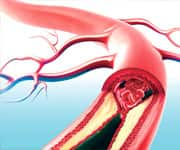
Your chances of having a heart attack or a stroke depend a great deal on the health of your endothelium.3,4 The endothelial cells use nitric oxide to signal the need for relaxation to arterial muscle cells.
As we age and develop pathological conditions such as atherosclerosis, our ability to produce and respond to nitric oxide rapidly diminishes.11-13 Aging humans generate more oxidative and inflammatory molecules that deplete nitric oxide production.13,14
The result is endothelial dysfunction, a serious condition that leads to arteries “stiffening” and losing their ability to respond to changes in blood flow and pressure. Endothelial dysfunction is often initiated as a result of oxidative stress.3 A major cause of damage in arterial walls is oxidation of LDL (low-density lipoprotein).15 Oxidized LDL is taken up by specialized receptors on endothelial cells to form atherosclerotic plaques.11,12
In a vicious cycle, chronic inflammatory reactions cause further oxidant damage, which results in further reduction in nitric oxide availability, and finally, further reduction of endothelial control over blood flow and pressure.3 This cycle sets the stage for high blood pressure and all the cardiac events that can result from this condition.3
Statin drugs are prescribed by physicians to reduce overall cholesterol production, thereby lowering LDL levels and helping to prevent further growth of plaques and inflammatory changes.16,17 Too often, however, statin therapy is initiated after dangerous changes have occurred in the endothelium and muscular walls of arteries.
Fortunately, extensive research demonstrates that pomegranate extracts enhance the body’s natural protective responses to prevent endothelial dysfunction, promote healthy mechanisms, and even remove oxidized LDL from arterial walls.
Factors Of Reduced Endothelium-Dependent Dilation13,18
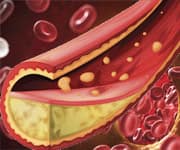 |
Listed below are the factors that contribute to impaired endothelial-dependent dilation, resulting in arteries that are stiff and relatively unresponsive to changes in blood flow and pressure, which ultimately triggers stroke and heart attack.
- Increased production of superoxide and other reactive oxygen species in aging
- Upregulation of oxidant-producing enzymes (e.g., NADPH oxidase)
- Increased bioactivity of artery-constricting endothelin-1
- Reduced endothelial production of/responsiveness to artery-dilating compounds
- Development of vascular inflammation
- Formation of advanced glycation endproducts (AGEs)
- Increased rate of endothelial cell apoptosis(programmed cell death)
- Reduced expression of estrogen receptor alpha (in postmenopausal women)
Pomegranate Boosts Your Body’s Defenses
Your body has natural mechanisms to protect your cardiovascular health, but they become weakened and ineffective over time.
For example, your body is equipped with specialized mechanisms that move cholesterol from tissues back to the liver for clearance.19 It also has specialized protein complexes that protect cholesterol from oxidizing to cause plaques. It even has its own specialized mechanisms for mopping up destructive free radicals like superoxide that promote oxidation and inflammation, and reduce vital supplies of artery-dilating nitric oxide.20-24
Pomegranate extracts directly aid your own body’s defense mechanisms and prevent catastrophic outcomes. Pomegranate extracts:
- Enhance cholesterol outflow from inflammatory white blood cells, helping to reduce the risk of plaque formation.5,6,25
- Protect vulnerable LDL molecules from the oxidation that leads to arterial wall inflammation and promotes plaque generation.6,7
- Boost natural antioxidant systems, particularly superoxide dismutase (SOD), protecting vital nitric oxide and allowing the endothelium to recover from the effects of chronic oxidative and inflammatory stresses.26-28 (See sidebar on page 56 for additional benefits of supplementing directly with SOD.)
What You Need To Know
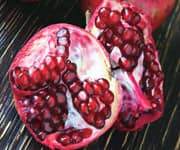 |
Endothelial Dysfunction
- Your endothelium is a super-thin layer of cells lining the arteries that control blood flow and pressure.
- But the endothelium’s regulatory abilities fade with age, the victims of ever-present oxidant stress and inflammation.
- Poor endothelial health is the primary factor in the development of stiff, unresponsive, atherosclerotic arteries, which leads to heart attacks and strokes.
- Pomegranate extracts contain a host of natural molecules that gently assist your body in restoring its own natural endothelial defense mechanisms.
- Pomegranate extracts protect LDL cholesterol from dangerous oxidation, and enhance activity of the body’s antioxidant mechanisms.
- Studies show that pomegranate supplementation improves endothelial health, which may reduce the risk for heart attacks, strokes, and other cardiovascular events.
- Adding an oral superoxide dismutase (SOD) supplement further promotes endothelial defense by bolstering natural antioxidant mechanisms.
- Some members use formulas that provide standardized pomegranate and a special SOD-boosting compound that is protected against degradation in the digestive tract.
Pomegranate’s Endothelial Defense Mechanisms
Pomegranate contains a number of extremely potent antioxidant molecules including tannins and anthocyanins, which have been shown to exert important endothelial-protective, anti-atherosclerosis effects.7,29 Pomegranate’s multiple therapeutic targets include those dangerous oxidized LDL particles and the inflammatory white blood cells that stream into developing plaques, eventually causing them to block arteries and cause heart attacks or strokes.5,7,29
Pomegranate contains particularly potent polyphenols that protect against LDL and HDL oxidation, which helps minimize endothelial dysfunction in its earliest stages.7
A unique property of pomegranate is its ability to boost activity of a beneficial enzyme called paraoxonase-1 (PON-1), which is found in beneficial HDL and accounts for many of its “good cholesterol” features by breaking down oxidized lipids, even those that have already been taken up into plaques.5,7
In a mouse model of coronary heart disease, treatment with pomegranate extract had a number of benefits to reduce atherosclerotic plaque.30 The size of atherosclerotic plaques in the animals’ aortas shrank, and the proportion of coronary arteries clogged with plaques was markedly reduced. Inside the plaques, researchers found substantial reduction in oxidative stress, inflammatory signaling molecules, and inflammatory white blood cells. And treated animals’ hearts remained normal in size, not enlarging and developing electrocardiogram (ECG) abnormalities as in control animals.30
In a rat study, researchers administered the cancer chemotherapy drug doxorubicin, which has cardiotoxic effects that mimic some of the damage seen following a heart attack. Doxorubicin also produces intense oxidative stress.31,32 The group given doxorubicin plus a whole-fruit extract of pomegranate had less pronounced ECG abnormalities and beneficial reductions in heart rate compared to the group that was only given the drug. Chemical analysis of their blood revealed significant decreases in the markers of muscle damage creatine kinase (CK-MB) and lactate dehydrogenase (LDH). Levels of the beneficial antioxidant glutathione rose significantly in treated animals as well. Microscopic examination of heart tissue demonstrated protection against muscle cell damage caused by the drug.
The previous two studies show pomegranate’s great promise in preventing atherosclerosis and protecting heart muscle from oxidant damage. A third study, however, illustrates that pomegranate juice can, in fact, slow development of even advanced atherosclerosis. Here, scientists used young mice genetically programmed to develop atherosclerosis, treating them with pomegranate juice or placebo for two months.5 Pomegranate juice intake led to increased PON-1 activity, which protects the function of HDL in transporting cholesterol out of arteries and back to the liver for disposal. PON-1 also reduced the amount of oxidized LDL taken up by 31% in certain inflammatory white blood cells compared with controls.
Remarkably, pomegranate supplementation also increased the rate of cholesterol flow out of those immune cells by 39%. Compared with placebo-treated mice, supplemented animals had a reduction in the size of plaques in their arteries of 17%. This is the first study to show so clearly that pomegranate juice supplementation is capable of attenuating the development of even advanced atherosclerosis.5
A late 2013 study reveals still more about the potential role of pomegranate juice and extracts in protecting endothelial health. An early stage in the development of atherosclerosis is the accumulation of oxidized LDL in inflammatory cells called macrophages. Israeli scientists found that by adding pomegranate juice to such inflammatory cells in combination with a statin drug (simvastatin), they could significantly improve the statin’s ability to block production of cholesterol in the cells.33 Moreover, pomegranate increased the statin’s ability to diminish oxidative stress. These results reveal the tremendous potential for pomegranate to supplement existing benefits of statins, perhaps allowing lower doses of these synthetic drugs.33
Superoxide Dismutase For Supercharged Antioxidant Protection
 |
Your body is equipped with many self-defense mechanisms to protect itself from endothelial dysfunction. Among these is a set of antioxidant enzyme systems that can help convert dangerous reactive oxygen species into water and oxygen molecules.39 Among the most prominent of these enzymes is superoxide dismutase, or SOD. SOD is found throughout the body, especially in tissues exposed to the most extreme oxidant stresses, but it is used up in the process of fighting those stresses.40,41
Pomegranate supplementation can boost SOD levels as part of its self-healing actions, but you can also supplement directly with SOD.
SOD has been used for years as an injection to benefit people with joint disorders, such as arthritis, and those receiving radiation therapy for cancer.42-47 Oral supplementation with SOD was not practical until recently, because the enzyme is rapidly digested in the stomach.
A form of the SOD enzyme has been invented that protects it from stomach digestion. This form is known as GliSODin®, since it contains grain-derived gliadin proteins that envelop the SOD and keep it from destruction.48
Studies show that oral supplementation with GliSODin® significantly elevates circulating antioxidant enzyme activities and increases cellular resistance to oxidative damage.31 At the same time, GliSODin® prevented oxidative destruction of mitochondria, the cellular energy sources.48
In human studies, GliSODin® was effective in controlling the intima-media thickness of the carotid artery (the main artery to the brain and an important predictor of cardiovascular risk) and in boosting antioxidant activity and controlling inflammation in athletes during a high-intensity workout.49,50 And in mice undergoing restraint stress (a model of the impact of stress on endothelial function), animals treated with GliSODin® had better spatial learning memory than control animals, demonstrating the value of controlling oxidant stress throughout the body.51
Human Studies Support Pomegranate
Pomegranate’s ability to mobilize the body’s own self-defense forces against endothelial dysfunction are validated by human studies. A dose of 150 mL of fresh pomegranate juice once daily for two weeks in patients with hypertension demonstrated reductions in both systolic (top number) and diastolic (bottom number) blood pressures. These changes were accompanied by significant decreases in levels of vascular cell adhesion molecule-1 (VCAM-1), an important endothelial-produced inflammatory protein.8,34 These changes after such a short period indicate the potential for long-term benefit of pomegranate supplementation on blood pressure and the inflammation that raises risk for heart attack and stroke.8
One common way of determining endothelial function and early atherosclerosis risk is to measure the thickness of inner and middle layers of the arterial wall, where the endothelium and muscle layers lie, respectively.35 This measure, called intima-media thickness (IMT) after the names of those layers, is an excellent predictor of future cardiovascular events.36 Increased IMT is associated with vascular risk factors and cardiovascular diseases.36
In a study of pomegranate juice supplementation in a group of people who already had increased IMT, the results showed those who did not consume the pomegranate had a 9% increase in IMT over one year. Those who did drink pomegranate juice had an average reduction in IMT of up to 30%.9 This was accompanied by an 83% increase in the patients’ levels of the beneficial antioxidant enzyme PON-1. Additionally, levels of oxidized LDL dropped by 90%, further reducing risk of heart attack or stroke, probably related to the fact that total antioxidant status was increased by 130% after a year of pomegranate supplementation. These beneficial changes were accompanied by a 12% reduction in systolic blood pressure over one year.9
A subsequent study revealed that pomegranate supplementation also reduced progression of IMT thickening in those subjects with the worst oxidative stress and highest triglyceride/lowest HDL groups.10 These studies provide direct evidence of how pomegranate ramps up the body’s protective responses to reduce the risk of cardiovascular disease.
In a remarkable 2014 study, researchers found that adding pomegranate extract to the cholesterol-lowering drug simvastatin lowered dangerous production of reactive oxygen species in white blood cells from patients with high cholesterol by 30%, compared with only an 18% decrease in those on the drug only.37 Similarly, the pomegranate-plus-simvastatin group saw a significant 48% reduction in triglyceride levels, which did not fall in the drug-only group.37
Pomegranate seed oil contains punicic acid, a beneficial fatty acid unique to pomegranate. Lab studies have shown it to have powerful anti-atherogenic effects.38 A human study demonstrated that after four weeks of pomegranate seed oil, 400 mg twice daily in people with high cholesterol, their triglyceride levels fell from 306 mg/dL to 244 mg/dL, and their ratios of triglyceride to HDL cholesterol (an important measure of cardiovascular risk) fell from 7.5 to a safer 5.7. Supplemented patients also had a beneficial increase of 5 mg/dL in HDL-cholesterol, which fell by 0.77 mg/dL in placebo recipients.38
Editor’s note: Triglyceride levels should optimally be below 100 mg/dL. Fish oil and the prescription drug metformin can sharpy lower triglyceride levels.
Enhancing HDL’s Ability To Remove Arterial Plaque
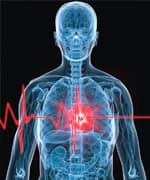 |
Scientists long ago documented the ability of HDL (high-density lipoprotein) to remove cholesterol affixed to arterial walls and transport it to the liver for safe disposal.
This is why it is so important to maintain HDL levels above 50 mg/dL of blood and follow steps Life Extension® has outlined to ensure optimal reverse cholesterol transport of lipids away from the arterial wall.
HDL does more than just cleanse arterial walls of plaque. It also protects LDL against oxidation, while inhibiting chronic inflammation, vascular adhesion molecules, and platelet activation—factors that can all lead to atherosclerosis.
For HDL to perform its vital functions, an enzyme called paraoxonase-1 (PON-1) is attached to its surface.
As humans age, PON-1 levels markedly decline, thereby reducing the ability of HDL to protect against heart attack and stroke. This phenomenon helps explain the onset of accelerated atherosclerosis, where within a period of only a few years, an aging person’s healthy arteries rapidly occlude with plaque.
The age-related reduction in PON-1 may also explain studies showing that statin drugs lose their benefit in certain aging populations, since the effects of statins are no longer sufficient to protect against the multiple factors involved in the development of atherosclerosis in the elderly.52-54
Lipid peroxidation is a free-radical reaction that severely damages cell membranes and is implicated in a host of degenerative diseases. PON-1 blocks destructive lipid peroxidation reactions,55-58 making it a crucial enzyme for aging humans to maintain.
PON-1 is anchored to the surface of HDL and is emerging as a formidable defense against atherosclerosis, diabetes , stroke, arthritis, and certain forms of cancer.
Pharmaceutical companies would pay a king’s ransom for a drug that elevates PON-1 levels in the body. Fortunately, scientists have discovered low-cost natural methods to elevate PON-1, such as consuming pomegranate.
Summary
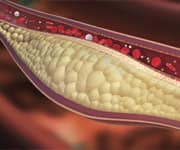
Your endothelium, the thin layer of cells lining your blood vessels, is the major regulator of blood flow and pressure, communicating with the smooth muscle cells via signaling molecules including nitric oxide.
Aging increases oxidant stresses that destroy nitric oxide, while simultaneously reducing protective antioxidant mechanisms. This leads to atherosclerosis, formerly known as “hardening of the arteries,” which in turn, is the major cause of heart attack and stroke.
Pomegranate extracts act via several different, but complementary mechanisms to restore the body’s endothelial defenses, lowering risk factors for a cardiovascular event, and helping to keep arteries supple and youthful. Pomegranate extracts have been shown to promote cholesterol outflow from macrophages, to enhance natural antioxidant systems like superoxide dismutase (SOD), and to directly protect LDL from oxidant damage and resulting inflammation.
A robust form of the antioxidant enzyme SOD has been developed that enhances SOD activity beyond what is provided by pomegranate. Studies show that this product, GliSODin®, survives passage through the stomach to boost SOD levels, which may reduce cardiovascular risk by improving endothelial health.48
If you have any questions on the scientific content of this article, please call a Life Extension® Health Advisor at 1-866-864-3027.
References
- Gawryszewski VP, Souza Mde F. Mortality due to cardiovascular diseases in the Americas by region, 2000-2009. Sao Paulo Med J. 2014;132(2):105-10.
- Kelly BB, Narula J, Fuster V. Recognizing global burden of cardiovascular disease and related chronic diseases. Mt Sinai J Med. 2012 Nov-Dec;79(6):632-40.
- Houston M. The role of nutrition and nutraceutical supplements in the treatment of hypertension. World J Cardiol. 2014 Feb 26;6(2):38-66.
- Stoltz JF, Muller S, Kadi A, Decot V, Menu P, Bensoussan D. Introduction to endothelial cell biology. Clin Hemorheol Microcirc. 2007;37(1-2):5-8.
- Kaplan M, Hayek T, Raz A, et al. Pomegranate juice supplementation to atherosclerotic mice reduces macrophage lipid peroxidation, cellular cholesterol accumulation and development of atherosclerosis. J Nutr. 2001 Aug;131(8):2082-9.
- Rosenblat M, Volkova N, Aviram M. Pomegranate juice (PJ) consumption antioxidative properties on mouse macrophages, but not PJ beneficial effects on macrophage cholesterol and triglyceride metabolism, are mediated via PJ-induced stimulation of macrophage PON2. Atherosclerosis. 2010 Sep;212(1):86-92.
- Aviram M, Rosenblat M. Pomegranate for your cardiovascular health. Rambam Maimonides Med J. 2013 Apr;4(2):e0013.
- Asgary S, Sahebkar A, Afshani MR, Keshvari M, Haghjooyjavanmard S, Rafieian-Kopaei M. Clinical evaluation of blood pressure lowering, endothelial function improving, hypolipidemic and anti-Inflammatory effects of pomegranate juice in hypertensive subjects. Phytother Res. 2014 Feb;28)2)193-9.
- Aviram M, Rosenblat M, Gaitini D, et al. Pomegranate juice consumption for 3 years by patients with carotid artery stenosis reduces common carotid intima-media thickness, blood pressure and LDL oxidation. Clin Nutr. 2004 Jun;23(3):423-33.
- Davidson MH, Maki KC, Dicklin MR, et al. Effects of consumption of pomegranate juice on carotid intima-media thickness in men and women at moderate risk for coronary heart disease. Am J Cardiol. 2009 Oct 1;104(7):936-42.
- Puddu GM, Cravero E, Arnone G, Muscari A, Puddu P. Molecular aspects of atherogenesis: new insights and unsolved questions. J Biomed Sci. 2005 Dec;12(6):839-53.
- Lee WJ, Ou HC, Hsu WC, et al. Ellagic acid inhibits oxidized LDL-mediated LOX-1 expression, ROS generation, and inflammation in human endothelial cells. J Vasc Surg. 2010 Nov;52(5):1290-300.
- Seals DR, Jablonski KL, Donato AJ. Aging and vascular endothelial function in humans. Clin Sci (London). 2011 May;120(9):357-75.
- Karbach S, Wenzel P, Waisman A, Munzel T, Daiber A. eNOS uncoupling in cardiovascular diseases - the role of oxidative stress and inflammation. Curr Pharm Des. 2014;20(22)3579-94.
- Ide N, Lau BH. Garlic compounds protect vascular endothelial cells from oxidized low density lipoprotein-induced injury. J Pharm Pharmacol. 1997 Sep;49(9):908-11.
- Sirtori CR. The pharmacology of Statins. Pharmacol Res. 2014 Mar 20. Pii:S1043- 66618(14)00025-5.
- Reilly SD, Litovsky SH, Steinkampf MP, Caulfield JB. Statins improve human coronary atherosclerotic plaque morphology. Tex Heart Inst J. 2008;35(2):99-103.
- Cosentino F, Rubattu S, Savoia C, Venturelli V, Pagannonne E, Volpe M . Endothelial dysfunction and stroke. J Cardiovasc Pharmacol. 2001 Nov;38 Suppl 2:S75-8.
- Yin K, Liao DF, Tang CK. ATP-binding membrane cassette transporter A1 (ABCA1): a possible link between inflammation and reverse cholesterol transport. Mol Med. 2010;16(9-10):438-49.
- Lobo V, Patil A, Phatak A, Chandra N. Free radicals, antioxidants and functional foods: Impact on human health. Pharmacogn Rev. 2010 Jul;4(8):118-26.
- Cuchel M, Rader DJ. Macrophage reverse cholesterol transport: key to the regression of atherosclerosis? Circulation. 2006 May 30;113(21):2548-55.
- Vohl MC, Neville TA, Kumarathasan R, Braschi S, Sparks DL. A novel lecithin-cholesterol acyltransferase antioxidant activity prevents the formation of oxidized lipids during lipoprotein oxidation. Biochemistry . 1999 May 11;38(19):5976-81.
- Holleboom AG, Daniil G, Fu X, et al. Lipid oxidation in carriers of lecithin:cholesterol acyltransferase gene mutations. Arterioscler Thromb Vasc Biol. 2012 Dec;32(12):3066-75.
- Goyal J, Wang K, Liu M, Subbaiah PV. Novel function of lecithin--terol acyltransferase. Hydrolysis of oxidized polar phospholipids generated during lipoprotein oxidation. J Biol Chem. 1997;272:16231–9.
- Fuhrman B, Volkova N, Aviram M. Pomegranate juice inhibits oxidized LDL uptake and cholesterol biosynthesis in macrophages. J Nutr Biochem. 2005 Sep;16(9):570-6.
- Dong S, Tong X, Liu H, Gao Q. Protective effects of pomegranate polyphenols on cardiac function in rats with myocardial ischemia/reperfusion injury. Nan Fang Yi Ke Da Xue Xue Bao. 2012 Jun;32(7):924-7.
- Mohan M, Waghulde H, Kasture S. Effect of pomegranate juice on Angiotensin II-induced hypertension in diabetic Wistar rats. Phytother Res. 2010 Jun;24 Suppl 2:S196-203.
- Shaban NZ, El-Kersh MA, El-Rashidy FH, Habashy NH. Protective role of Punica granatum (pomegranate) peel and seed oil extracts on diethylnitrosamine and phenobarbital-induced hepatic injury in male rats. Food Chem. 2013 Dec 1;141(3):1587-96.
- Aviram M, Rosenblat M. Pomegranate protection against cardiovascular diseases. Evid Based Complement Alternat Med. 2012;2012:382763.
- Al-Jarallah A, Igdoura F, Zhang Y, et al. The effect of pomegranate extract on coronary artery atherosclerosis in SR-BI/APOE double knockout mice. Atherosclerosis. 2013 May;228(1):80-9.
- Hassanpour Fard M, Ghule AE, Bodhankar SL, Dikshit M. Cardioprotective effect of whole fruit extract of pomegranate on doxorubicin-induced toxicity in rat. Pharm Biol. 2011 Apr;49(4):377-82.
- Zhou S, Palmeira CM, Wallace KB. Doxorubicin-induced persistent oxidative stress to cardiac myocytes. Toxicol Lett. 2001 May 19;121(3):151-7.
- Rosenblat M, Volkova N, Aviram M. Addition of pomegranate juice to statin inhibits cholesterol accumulation in macrophages: protective role for the phytosterol beta-sitosterol and for the polyphenolic antioxidant punicalagin. Harefuah. 2013 Sep;152(9):513-5, 565.
- Cook-Mills JM, Marchese ME, Abdala-Valencia H. Vascular cell adhesion molecule-1 expression and signaling during disease: regulation by reactive oxygen species and antioxidants. Antioxid Redox Signal. 2011 Sep 15;15(6):1607-38.
- Sobieszczyk P, Beckman J. Carotid artery disease. Circulation. 2006 Aug 15;114(7):e244-7.
- Lorenz MW, Markus HS, Bots ML, Rosvall M, Sitzer M. Prediction of clinical cardiovascular events with carotid intima-media thickness: a systematic review and meta-analysis. Circulation. 2007 Jan 30;115(4):459-67.
- Hamoud S, Hayek T, Volkova N, et al. Pomegranate extract (POMx) decreases the atherogenicity of serum and of human monocyte-derived macrophages (HMDM) in simvastatin-treated hypercholesterolemic patients: A double-blinded, placebo-controlled, randomized, prospective pilot study. Atherosclerosis. 2014 Jan;232(1):204-10.
- Mirmiran P, Fazeli MR, Asghari G, Shafiee A, Azizi F. Effect of pomegranate seed oil on hyperlipidaemic subjects: a double-blind placebo-controlled clinical trial. Br J Nutr. 2010 Aug;104(3):402-6.
- Chang MS, Lee SG, Rho HM. Transcriptional activation of Cu/Zn superoxide dismutase and catalase genes by panaxadiol ginsenosides extracted from Panax ginseng. Phytother Res. 1999 Dec;13(8):641-4.
- Marklund SL. Extracellular superoxide dismutase in human tissues and human cell lines. J Clin Invest. 1984 Oct;74(4):1398-403.
- Marklund SL. Extracellular superoxide dismutase and other superoxide dismutase isoenzymes in tissues from nine mammalian species. Biochem J. 1984 Sep 15;222(3):649-55.
- Afonso V, Champy R, Mitrovic D, Collin P, Lomri A. Reactive oxygen species and superoxide dismutases: role in joint diseases. Joint Bone Spine. 2007 Jul;74(4):324-9.
- Edsmyr F, Menander-Huber KB. Orgotein efficacy in ameliorating side effects due to radiation therapy. Eur J Rheumatol Inflamm. 1981;4(2):228-36.
- Esco R, Valencia J, Coronel P, Carceller JA, Gimeno M, Bascon N. Efficacy of orgotein in prevention of late side effects of pelvic irradiation: a randomized study. Int J Radiat Oncol Biol Phys. 2004 Nov 15;60(4):1211-9.
- Gammer W, Broback LG. Clinical comparison of orgotein and methylprednisolone acetate in the treatment of osteoarthrosis of the knee joint. Scand J Rheumatol. 1984;13(2):108-12.
- Lin Y, Pape HD, Friedrich R. Use of superoxide dismutase (SOD) in patients with temporomandibular joint dysfunction--a preliminary study. Int J Oral Maxillofac Surg. 1994 Dec;23(6 Pt 2):428-9.
- Mazieres B, Masquelier AM, Capron MH. A French controlled multicenter study of intraarticular orgotein versus intraarticular corticosteroids in the treatment of knee osteoarthritis: a one-year followup. J Rheumatol Suppl. 1991 Feb;27:134-7.
- Vouldoukis I, Conti M, Krauss P, et al. Supplementation with gliadin-combined plant superoxide dismutase extract promotes antioxidant defences and protects against oxidative stress. Phytother Res. 2004 Dec;18(12):957-62.
- Cloarec M, Caillard P, Provost JC, Dever JM, Elbeze Y, Zamaria N. GliSODin, a vegetal sod with gliadin, as preventative agent vs. atherosclerosis, as confirmed with carotid ultrasound-B imaging. Eur Ann Allergy Clin Immunol. 2007 Feb;39(2):45-50.
- Skarpanska-Stejnborn A, Pilaczynska-Szczesniak L, Basta P, Deskur-Smielecka E, Woitas-Slubowska D, Adach Z. Effects of oral supplementation with plant superoxide dismutase extract on selected redox parameters and an inflammatory marker in a 2,000-m rowing-ergometer test. Int J Sport Nutr Exerc Metab. 2011 Apr;21(2):124-34.
- Nakajima S, Ohsawa I, Nagata K, et al. Oral supplementation with melon superoxide dismutase extract promotes antioxidant defences in the brain and prevents stress-induced impairment of spatial memory. Behav Brain Res. 2009 Jun 8;200(1):15-21.
- Okumachi Y, Yokono K. Anti-aging medicine: the evidence to the value of the antihypertensive drugs, hypoglycemic drugs and statins. Nippon Rinsho. 2009 Jul;67(7):1372-6.
- Kekes E. Combined antihypertensive and antilipemic therapy as one of the pillars in the poly-pharmacologic preventive strategy for patients with high cardiovascular risk. Orv Hetil. 2008 Sep 28;149(39):1827-37.
- Gouedard C, Koum-Besson N, Barouki R, Morel Y. Opposite regulation of the human paraoxonase-1 gene PON-1 by fenofibrate and statins. Mol Pharmacol . 2003 Apr;63(4):945-56.
- Rozenberg O, Rosenblat M, Coleman R, Shih DM, Aviram M. Paraoxonase (PON-1) deficiency is associated with increased macrophage oxidative stress: studies in PON-1-knockout mice. Free Radic Biol Med. 2003 Mar 15;34(6):774-84.
- Leus FR, Wittekoek ME, Prins J, Kastelein JJ, Voorbij HA. Paraoxonase gene polymorphisms are associated with carotid arterial wall thickness in subjects with familial hypercholesterolemia. Atherosclerosis. 2000 Apr;149(2):371-7.
- Watson AD, Berliner JA, Hama SY, et al. Protective effect of high density lipoprotein associated paraoxonase. Inhibition of the biological activity of minimally oxidized low density lipoprotein. J Clin Invest. 1995 Dec;96(6):2882-91.
- Ikeda Y, Suehiro T, Itahara T, et al. Human serum paraoxonase concentration predicts cardiovascular mortality in hemodialysis patients. Clin Nephrol. 2007 Jun;67(6):358-65.

